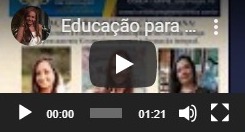
This work aims to analyze the methodology of teaching Portuguese as a second language, highlighting the result with contextualized classes simulating real everyday situations.
In these simulations, the educational proposal of insertion in the Portuguese language and Brazilian culture is reinforced, the Portuguese language is mediated in an experiential way. In this sense, language skills (listening comprehension, oral expression, reading comprehension and written expression) are practiced in historical and tourist environments that provide opportunities for interdisciplinarity that go beyond the technical skills of language and culture teaching.
Perrenoud’s (1999) ideas are reinforced in the construction of competences through regular and intense confrontation with complex and real situations that allow to mobilize different cognitive resources. This work, therefore, has as main objective, to discuss the skills developed through classes outside the traditional teaching environment and is justified by the need to include foreigners to the cultural environment, in all aspects, to the Brazilian universe. The relevance of this work is given in the opportunity of its immediate applicability in the existing spaces in which the language integrates communication through the new language whose culture is inseparable from the practical and contextualized universe.


